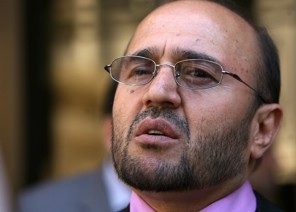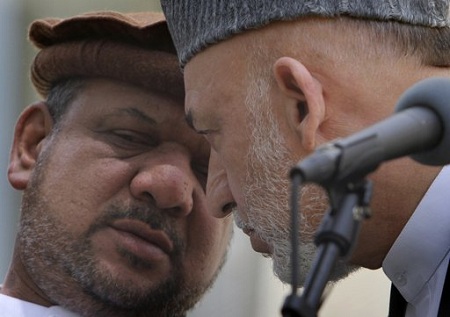By Pamela Constable

Abdul Qadir Fitrat, seen here in April, resigned as head of Afghanistan’s central bank and fled to the United States, saying his life is in danger over a corruption probe targeting influential figures connected to the government. (Photo: AFP/Getty Images)
KABUL —The Afghan government lashed out Tuesday at its former central bank president, who fled to Virginia and announced there Monday that he had resigned in fear for his life. Officials here have accused him of involvement in a major bank scandal and said he had nothing to fear but the law.
The former central bank head, Abdul Qadir Fitrat, told the Afghan parliament two months ago that a group of powerful Afghans, including a brother of President Hamid Karzai and a brother of First Vice President Mohammed Fahim, had received questionable loans from Kabul Bank, a private lender in which they were shareholders.
Kabul Bank nearly collapsed last year amid charges of financial mismanagement and revelations of potential losses totaling nearly $1 billion. It was later taken over by the central bank, but its continued problems and central role in state finances have made the International Monetary Fund wary of extending new credit to Afghanistan.
Fitrat, who had not been seen here in public for several weeks, said Monday in Northern Virginia that he had received death threats because of his disclosures and that his life in Afghanistan had become “completely endangered.” He said he intended to remain in the United States, where he is a permanent legal resident.
But Tuesday, Afghan officials directly contradicted his account, telling journalists that Fitrat was partly to blame for the Kabul Bank scandal and that he had spoken of the threats as an “excuse” to seek sanctuary abroad. They said the government had notified Interpol and would seek Fitrat’s return from the United States to face charges in the case.
“What he said is not true. It is just the excuse of those who commit crimes,” said Deputy Attorney General Rahmatullah Nazari. “The central bank had responsibility to oversee and inspect the Kabul Bank properly. Mr. Fitrat paid no attention and sent reports saying the bank was in good condition. This clearly shows the hand of the central bank in the crisis.”
The exchange of accusations among senior Afghan officials seemed likely to further damage the government’s political and financial credibility at a sensitive time, as the United States and other Western backers begin to withdraw troops and civilian workers in hopes that Afghan officials can fully take over their nation’s security and management by 2014.

The Washington Post, Jun. 28, 2011: Fitrat, in his testimony to parliament, complained that none of the prominent borrowers had been arrested or brought to justice, including the brothers of Karzai and Fahim. Fahim (left), a powerful former militia leader, still controls a virtual private army and has been widely reported to be involved in smuggling and other illicit activities.
Fitrat’s presence in the United States also threatens to place the Obama administration squarely in the middle of the Kabul Bank scandal, the last place it wants to be. In meetings with U.S. officials this week, Karzai said the United States is protecting the true culprit in the scandal. U.S. officials, who said the situation was still being assessed in Washington, declined to comment on Fitrat except to note his legal presence in Virginia and the lack of any pending charges against him.
The confrontation appeared to have been triggered by a report from a committee investigating the scandal; the report was turned over to the government this week. Waheed Omer, a spokesman for Karzai, said after learning of Fitrat’s resignation in absentia Monday night that the report had named him as one of those responsible for the bank’s near-collapse.
Two weeks ago, central bank officials held a news conference saying that the committee’s work had been completed. Fitrat was not present, and several other officials spoke instead. They said that more than $900 million was missing because of improper loans to shareholders and that borrowers had pledged to repay $483 million, but that only $62 million had been recovered.
“For the last time, we warn all borrowers to come in and clear their accounts,” one official said. “These loans are not forgivable. This money belongs to Kabul Bank, and it must be returned.” Asked who was responsible for the crisis, another official answered, “You people know who caused the crisis: the shareholders.”
Fitrat, in his testimony to parliament, complained that none of the prominent borrowers had been arrested or brought to justice, including the brothers of Karzai and Fahim. Fahim, a powerful former militia leader, still controls a virtual private army and has been widely reported to be involved in smuggling and other illicit activities.
Sherkhan Farnood, the flamboyant former chairman of Kabul Bank, alsowas reported to have borrowed more than $30 million. He has not been arrested, but his passport has been revoked. Much of the missing money reportedly was invested in real estate in the United Arab Emirates.
Nazari, asked Tuesday about these high-profile individuals and their debts, said, “To receive a loan from a bank is not a crime. If the money was loaned illegally, who is responsible? The giver or the receiver?”
The prosecutor said that developer Mahmoud Karzai, the president’s brother, had “repaid a lot of the money” he owed and that Fahim’s brother “has enough property to repay the money. There is no danger to Mr. Fitrat.”



